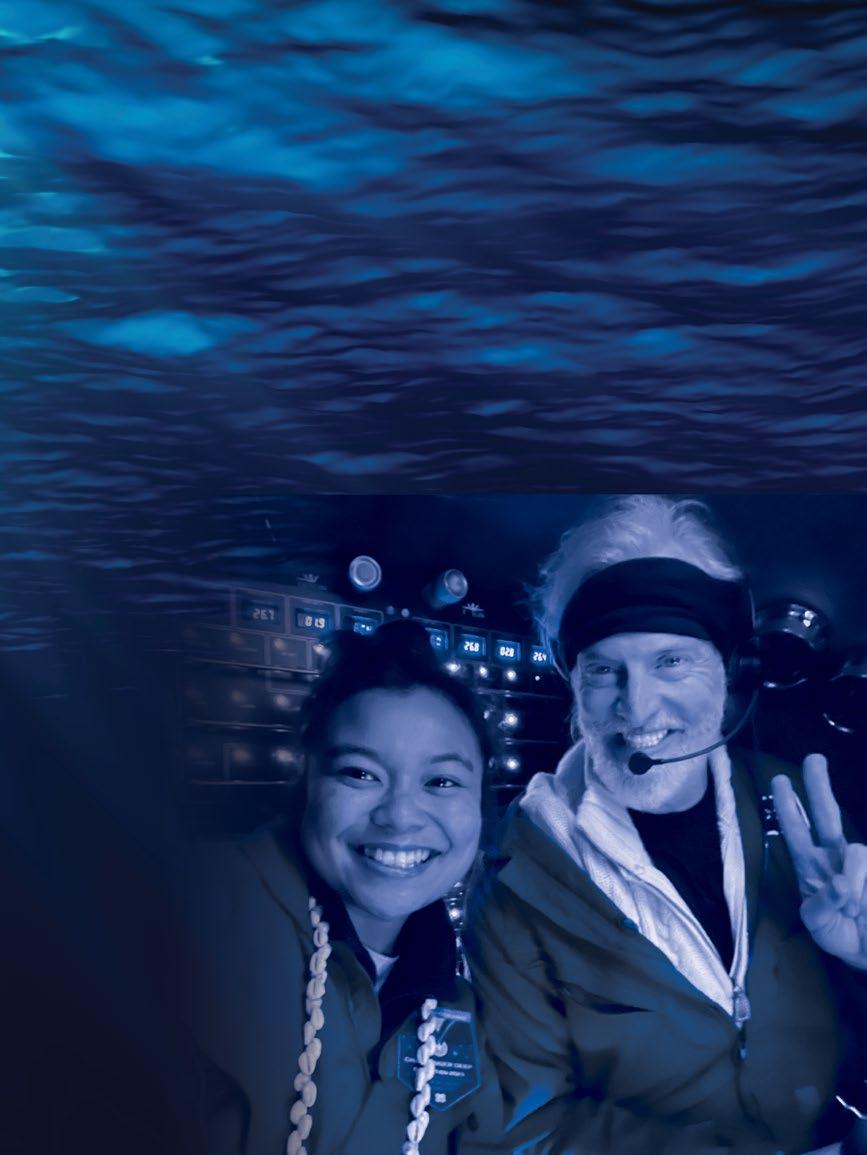
5 minute read
Under the Sea: Into Challenger Deep
UNDER THE SEA:
Into HAVE YOU EVER WONDERED WHAT SECRETS CAN BE FOUND AT THE OCEAN’S DEEPEST DEPTHS? SO HAS NICOLE YAMASE ’14. Challenger AND THEN SHE GOT TO TRAVEL THERE. Deep
Advertisement
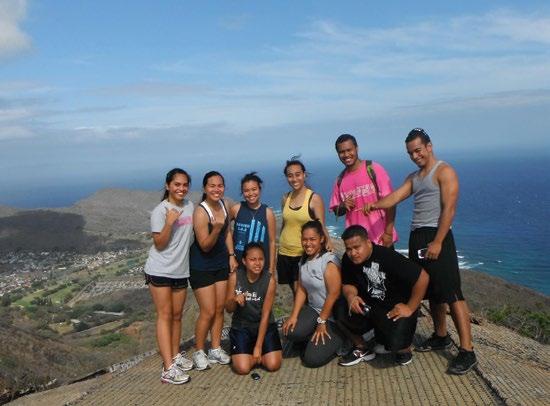
In March, Yamase was invited to jump into a special submersible and journey 35,856 feet (or as she likes to say, about 700 coconut trees stacked on top of one another) below the waves into the Challenger Deep—the deepest known spot in the ocean, located in the Mariana Trench.
Yamase, who is Micronesian, is the first Pacific Islander ever to make the trip.
She describes the place as nothing less than “unbelievable”—like an alien world.
“Once we slowly got to the bottom, I couldn’t believe my eyes,” she said, adding that the expedition down with ocean explorer Victor Vescovo—who organized the special dive—started about 10 a.m. Four hours later, they were there, staring into the murky, dark and deepest known depths of the ocean.
“It looks like a desert down there,” Yamase said.
REINFORCING PASSION FOR ENVIRONMENTAL STUDIES
Yamase, who graduated from Chaminade with a B.S. in Environmental Studies and a B.S. in Biology and is now seeking a doctoral degree in Marine Biology from the University of Hawai'i, was chosen for the journey because of her deep passion and previous work in helping to advocate for the oceans.
Vescovo, she said, “thought it was time” that someone from the Federated States of Micronesia was invited down to the Challenger Deep, which can be found in their country’s waters. And not just “someone” was chosen, but a young leader who is studying diverse marine ecosystems.
She got additional support for the journey from the Waitt Institute and Micronesia Conservation Trust.
Yamase said the experience of traveling to Challenger Deep was life-changing. It confirmed the incredible love she has for her research—she’s focused on studying the impacts of climate change on indigenous macroalgae important to Pacific reefs. And it underscored her other major academic focus: raising awareness about how climate change and rising sea levels are already impacting the Pacific.
“Humanity needs to improve its relationship with the world’s oceans,” Yamase said.
Because even the Challenger Deep wasn’t free of humanity’s fingerprint. When she was down there, nearly seven miles below the surface, she saw boating tethers—human trash. “The fact that trash has made it all the way down to the deep is very alarming,” Yamase said. “It’s just a really pressing problem.”
Yamase knows that better than most.
CLIMATE CHANGE IS A PROBLEM NOW
When she returns to her island of Pohnpei in the Federated States of Micronesia, she sees firsthand the sea levels rising higher than they ever have before. Friends and loved ones post photographs on social media of ocean water going into homes and of cemeteries being washed away.
Climate change isn’t a future problem for her country, she says; it’s a problem now.
And it will take everyone, including her generation and future ones, to fix it.
OPENING DOORS FOR PACIFIC ISLANDERS
“Through this expedition, I really just want to promote STEM—because Pacific Islanders, we need us,” Yamase said. “We’re the ones who are going to be in the field. We need local mentors, local role models, because that’s what we lack. It really has a huge impact to
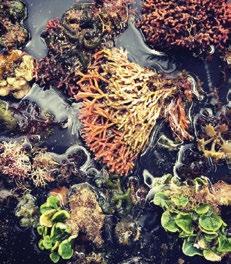
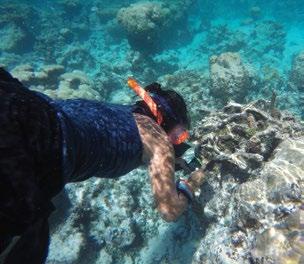
see your own succeed in the field.”
As she continues to make her mark, Yamase is grateful to her own mentors, including those at Chaminade. She said it was Environmental Science and Studies Dr. Gail Grabowsky, dean of the School of Natural Sciences and Mathematics, who encouraged her as a freshman to apply for a summer internship at UH-Mānoa focused on marine biology. “From that first experience, I was like, ‘Oh my goodness, this is for me,’” she said. She continued to be selected for internships and other opportunities, including a chance to study macroalgae in Miami’s Biscayne Bay.
That research formed the basis of the dissertation she’s now working on.
She said Biology Professor Jolene Cogbill, PhD, her adviser in the department, was also hugely instrumental in getting her linked up with opportunities that honed her skills—and bolstered her confidence. “They both really pushed me out of my comfort zone,” she said. “My first year, I never raised my hand. I couldn’t do it. After these summer internships of really participating in these opportunities with other Pacific Islanders, I thought, ‘I’m not alone in this.’”
Yamase said she also got the chance to present her work at conferences and symposia.
She said she hopes to be that same inspiration to other young Pacific Islanders, especially those in environmental science, marine conservation and biology. She said her expedition into the Challenger Deep “was such a great opportunity to show young Pacific Islanders that we can do it.”
“There’s not that many of us in the science fields. Hopefully, this opens up doors.”
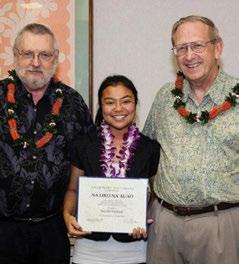
1960s
Wayne Ishihara | B.A. MARKETING ‘68 The Honolulu Japanese Chamber of Commerce (HJCC) announced that President and CEO Wayne Ishihara retired in October 2021. He served as HJCC’s president and CEO for more than a decade and had a distinguished career in banking, business and community service with a focus on strengthening US-Hawai'i and Japan relations. He helped to lead HJCC through a period of growth and success, including growing membership during the COVID pandemic. Wayne also has the distinction of being one of only two people in the history of the organization to have served as both volunteer board chair and executive president of HJCC.
1990s
Thomas P. Delaine, Jr.
B.A. BUSINESS ‘92, MBA ‘94 Thomas retired in September 2017, having served as Director of Information Security for Comprehensive Health Services. He currently lives in Jacksonville, Florida with dreams of residing on O'ahu in the near future. He is looking to be more involved with community service and mentorship programs for disadvantaged and low-income young people. In May 2021, he visited Chaminade and caught up with business professors Dr. Wayne Tanna and Dr. John Steelquist.
Veronica Lynn Tanis DePotty
B.A. INTERNATIONAL RELATIONS AND AFFAIRS ‘97 Veronica is the departmental analyst and HUD grant manager for the Michigan State Housing Development Authority. She was recently selected as a presenter for HUD’s national conference in August 2021.
Mark-Jason Solofa
B.A. BUSINESS ADMINISTRATION ‘91 Mark-Jason resides in the Bay Area and owns Mark Jason Solofa Men’s Grooming. Not only known for his grooming skills, he loves to provide daily inspirational posts on Instagram. Follow him @mjsolofamensgrooming or at mjsolofa.com.










